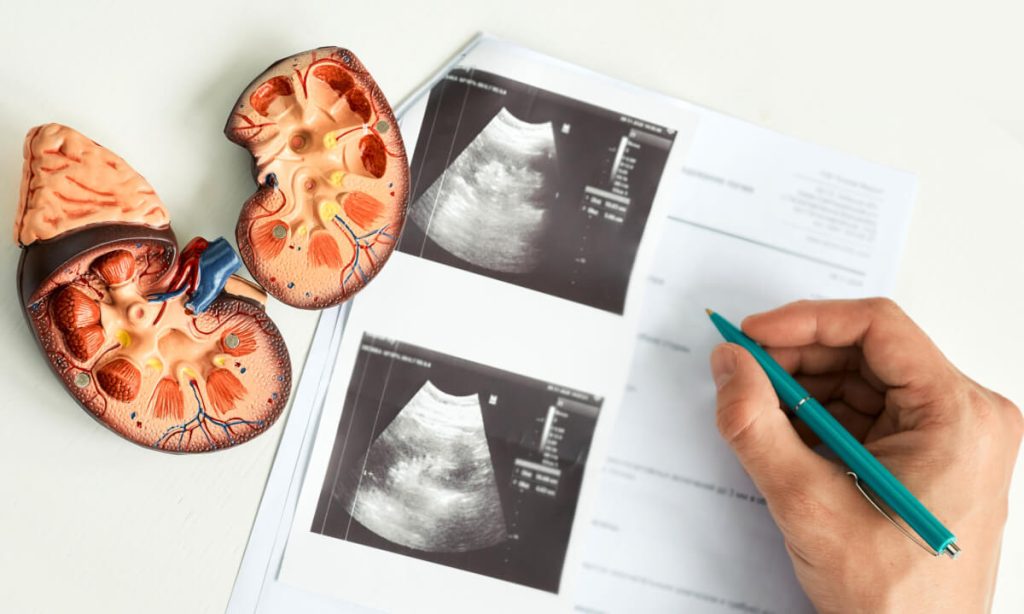

(Photo by Peakstock on Shutterstock)
In a nutshell
- Researchers developed personalized cancer vaccines for nine high-risk kidney cancer patients, with all participants remaining cancer-free after nearly three years of follow-up – a significant advancement for a cancer type that traditionally has limited treatment options.
- Unlike previous approaches, this vaccine strategy successfully targeted specific mutations driving kidney cancer growth, generating strong immune responses even though kidney cancer typically has fewer mutations to target compared to other cancers.
- The treatment demonstrated remarkable safety, with only mild side effects like injection site reactions and temporary flu-like symptoms – a dramatic improvement over current immunotherapy treatments that can cause severe complications in up to 21% of patients.
BOSTON — In a remarkable advancement for cancer immunotherapy, researchers at Dana-Farber Cancer Institute have developed personalized vaccines that successfully triggered immune responses in all nine patients with high-risk kidney cancer. At a median follow-up of 34.7 months after beginning treatment, none of the participants experienced cancer recurrence, marking a significant milestone in the fight against advanced renal cell carcinoma (RCC).
Standard treatment for patients with stage III or IV clear cell RCC typically involves surgical removal of the tumor, sometimes followed by immunotherapy with pembrolizumab. While this approach helps reduce recurrence risk, approximately two-thirds of patients may still experience cancer return, leaving them with limited treatment options.
“Patients with stage III or IV kidney cancer are at high risk of recurrence,” says Dr. Toni Choueiri, Director of the Lank Center for Genitourinary Cancer at Dana-Farber, in a statement. “The tools we have to lower that risk are not perfect and we are relentlessly looking for more.”
Manufacturing personalized cancer vaccines presents unique challenges for tumors with low mutation counts, like kidney cancer. Unlike melanoma or lung cancer, which typically have hundreds of mutations that can be targeted, kidney cancers offer fewer opportunities for vaccine development. Despite this hurdle, researchers successfully created individualized vaccines for all nine trial participants.
The vaccine development process began by analyzing tumor tissue removed during surgery. Scientists identified molecular features called neoantigens — tiny fragments of mutant proteins present only in cancer cells — that differentiate tumor cells from normal ones. Using predictive algorithms, the team selected the most promising neoantigens likely to provoke an immune response.
Seven participants received vaccines targeting mutations in key kidney cancer-driving genes, including VHL, PBRM1, BAP1, KDM5C, and PIK3CA. Remarkably, six out of seven patients mounted immune responses against these cancer-driving mutations.
The treatment protocol involved both intradermal and subcutaneous injections. Five participants also received low-dose ipilimumab, an immunotherapy drug, at the injection sites. Patients received five initial doses over 22 days, followed by two booster shots at weeks 12 and 20.
Through detailed analysis, researchers discovered that the vaccine induced immune responses within three weeks. The number of vaccine-induced T cells increased by an average of 166-fold, maintaining high levels for up to three years. Laboratory studies confirmed these T cells could actively target patients’ tumor cells.
“This approach is truly distinct from vaccine attempts in kidney cancer,” says Dr. David A. Braun, formerly of Dana-Farber and now at Yale Cancer Center. “We pick targets that are unique to the cancer and different from any normal part of the body, so the immune system can be effectively ‘steered’ towards the cancer in a very specific way.”
Safety data proved particularly encouraging. While all patients experienced injection site reactions and most had temporary flu-like symptoms, no severe side effects occurred. This favorable safety profile contrasts significantly with current immunotherapy treatments for kidney cancer, which can cause serious complications requiring treatment discontinuation in up to 21% of patients.
The research team’s success has led to an ongoing multicenter international randomized study using a similar neoantigen-targeting personalized cancer vaccine in combination with pembrolizumab immunotherapy.
Path to FDA Approval
While these early results are promising, the road to FDA approval for personalized cancer vaccines requires several more phases of clinical testing. The current Phase I trial with nine patients primarily demonstrated safety and the ability to generate immune responses. However, much larger studies are needed to prove the vaccine’s effectiveness in preventing cancer recurrence.
The next crucial step is the ongoing multicenter international randomized trial (NCT06307431) that combines the neoantigen vaccine with pembrolizumab immunotherapy. This larger study will need to demonstrate statistically significant improvements in outcomes compared to standard treatment. Researchers will track key metrics like disease-free survival, overall survival rates, and quality of life measures.
To achieve FDA approval, the vaccine would likely need to complete a successful Phase III trial involving hundreds of patients across multiple treatment centers. This trial would need to show clear evidence that the vaccine significantly reduces cancer recurrence rates or extends survival compared to current standard treatments. The study would also need to continue monitoring patients for several years to assess long-term effectiveness and safety.
One unique challenge for personalized cancer vaccines is that each treatment is custom-made for individual patients. The FDA will need to evaluate not just the treatment’s effectiveness, but also the consistency and reliability of the manufacturing process. This includes validating the methods used to identify neoantigens, produce the vaccine components, and ensure quality control across different production sites.
Additionally, cost-effectiveness studies will be crucial since personalized vaccines require sophisticated analysis and manufacturing processes for each patient. Insurance companies and healthcare systems will need evidence that the benefits justify the expenses involved in this individualized approach.
If larger trials confirm the promising results seen in this initial study, the personalized vaccine could potentially receive FDA approval within 5-7 years, though this timeline depends heavily on trial recruitment rates, results, and regulatory review processes. The treatment might first receive approval for high-risk kidney cancer patients who have undergone surgery, with the possibility of later expanding to other stages of kidney cancer or different types of cancer with similar molecular profiles.








